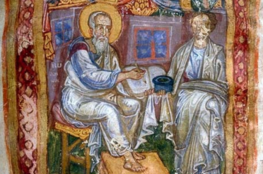I don’t normally read the Los Angeles Review of Books, but one of its latest essays, “Two Abysses of the Soul” by Costica Bradatan is an outstanding example of using literary analysis to tease out a cultural truth, even when that truth is unsettling. Here is a brief excerpt:
Toward the end of The Brothers Karamazov, as the prosecutor Ippolit Kirillovich makes his case for Dmitri Karamazov’s condemnation, he brings up the image of two abysses between which the defendant, in his view, is caught. One is the “abyss beneath us, an abyss of the lowest and foulest degradation,” while the other is “the abyss above us, an abyss of lofty ideals.” “Two abysses, gentlemen,” says the prosecutor, “in one and the same moment — without that […] our existence is incomplete.”
This image of the two intertwined abysses can be said to be a picture of Russia itself. The basest and the highest, the most despicable and the noblest, profanity and sainthood, total cynicism and winged idealism, all meet here. Andrei Tarkovsky has an uncanny ability to articulate this synthesis of opposites into a mystical vision of sorts — most of his films take the viewer from the depths of a dark, corrupted world all the way up to a realm of splendors and a vision of beatitude. In Andrei Rublev that happens literally as, at the end of the film, you are led from a black-and-white “vale of tears,” all mud and blood, to the serene contemplation of Rublev’s divine images, all in full color now. Outsiders may find this hard to take, but for a Russian sensibility such a transition is a natural movement. There is no break here, just the normal traffic between the two abysses of the soul.
It a strange testament to Russia’s (and Vladimir Putin’s) current capacity to alienate and unsettle “the West” that when it comes to Russia’s ethno-nationalist identity, the rules of political correctness have been suspended. Under normal circumstances it is impossible in today’s (post)modern intellectual world to speak of collectives or their “souls,” and yet that is exactly what Bradatan has done here — with astonishing precision. If I have any quibble with the piece, it’s that the author chose two Soviet-era acts of casual barbarism — the Katyn Massacre and the Holodomor — as examples of the “low abyss” of the Russian soul when so many Russians (and their apologists) today have become so adept at disowning their nation’s previous political-ideological identity when it doesn’t suit them (and then embracing it tenderly when it does). For decades the Russian Orthodox Church has strenuously campaigned for the idea that Soviet barbarism was an aberration, a horrid blight on an otherwise unsullied Christian cultural posture, which says little about Russia and much more about Jews, atheists, Westernizing influences, or anything and everything else allegedly “responsible” for those 70 years of state-sponsored terror. Responsibility, repentance, and restitution are not, it would seem, part of the Russian soul — high or low.



